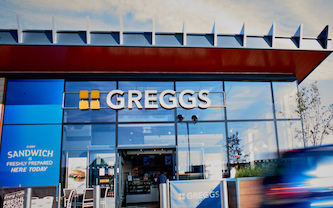Newcastle-based Greggs reported higher first-half sales and profit and kept its forecast unchanged as it benefited from growth in evening meals, delivery and food ordered on its app.
Total sales for the 26 weeks to 29 June were £960.6 million, up 14% from £844 million in the same period a year ago. Underlying pre-tax profit was £74.1 million, up from £63.7 million a year ago, excluding an exceptional gain from the settlement of a Covid business interruption insurance claim.
“Greggs has made good progress in the first half of the year, further broadening our range of on-the-go food and drink whilst making it more accessible to more customers,” said Roisin Currie, Chief Executive. “Our cost outlook for 2024 remains unchanged and we continue to trade in line with our plan. The Board remains confident in the long-term growth strategy, and we are investing to support that growth.”
Greggs said its post-4pm sales grew more strongly than the average like-for-like rate, while it increased the number of shops that offer delivery services on both the Just Eat and Uber Eats platforms. It said use of the Greggs App has grown, with 18% of company-managed customer transactions scanned as part of its loyalty programme in the first half.
The food chain, which started in the north of England but is now national, said it opened 99 new shops in the period, including 25 franchised units and 30 relocated shops. It closed 18 shops, resulting in 51 net new shops in the period and a total of 2,524 shops overall, of which 524 are franchised.
Matt Britzman, senior equity analyst at Hargreaves Lansdown, said: “Greggs has showcased its strengths once more, as the UK’s favourite baker continues to deliver. A high bar’s been set over the past year or so, but results have beat expectations once again. The value offering that Greggs is so well known for has been holding it in good stead of late, and it was good to see that continue over the half with like-for-like sales well ahead of the industry average.”
“Perhaps unusual for a business geared to growth, management is keen to make sure investors are paid while they wait, and growing dividends are part of the attraction. The cash hoard on the balance sheet is expected to be flexed to cover increased growth investment, but that’s precisely what it’s there for.”
